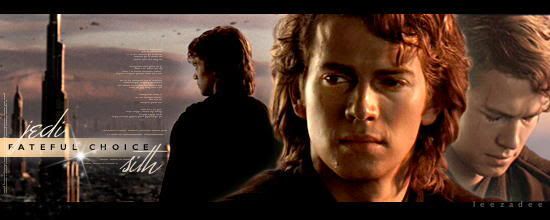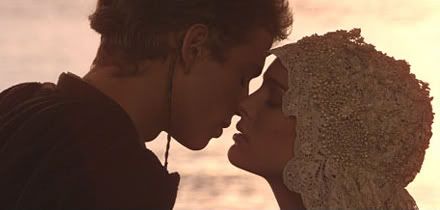Post by crystalcat on Aug 28, 2006 16:33:12 GMT -5
Legacy, a Star Wars short story alternate ending to ROTS
I knew them from the holovid; at least I knew their faces - the Jedi fighting to preserve the
Republic in the Clone War (known at the time as the Civil War). Prominent among the humans
was Obiwan Kenobi, always tacitly urbane and perfectly groomed, always able to say the right
thing in a humorously adroit manner. But equally often the younger and more dangerous-looking
Anakin Skywalker would appear - tall, broad-shouldered, and invariably dressed in unrelieved
black. With his wild golden hair he was not as neat; nor was he as articulate as Master Jedi
Kenobi, but he had a magnetism which penetrated the holovid and made him popular with the
young female set (who were either ignorant of the Jedi lifestyle, or felt themselves safe because of
it). I myself mistrusted his charisma - I suppose I found it unsuitable for a Jedi, though I
conceded he helped to popularize the sect at a time when it had declined.
But I digress. My intent was to tell what these people - and the Jedi as an order - were really like
in those times, at least from my limited personal experience. And as I found out, it is patently not
possible to know what someone is like from watching them on the holovid.
My second son, Jharadi, had joined the order at the age of five. To set matters straight, we took
our children for voluntary testing when the Jedi came through our city for recruitment. Although
our younger son had some sensitivity, Jharadi’s was stronger and they asked if he would join.
Everything was explained, including the fact that there would be no further contact with him,
though we were assured that if he failed his initial testing, he would come home (and we were
given a time period beyond which we knew he had passed the test). We were certainly not
forced or coerced. In fact, two families declined to send their children when they learned the
terms and there was absolutely no action taken against them. I make this distinction because I
have heard horror stories told and retold by the ignorant of the Jedi “stealing babies.” They do
not. To continue, however, we chose to let Jharadi go with them - he wanted to go, though
admittedly we weren’t sure whether he understood he would be leaving us forever. Still, there
was an assurance that he could leave the order at any time of his own free will if he decided it
wasn’t for him. Events since this give me no reason to disbelieve this statement; I suspect the
reason few leave is that after once learning their “craft” they find there is nowhere else they may
openly practice it.
I begin my narrative on a day about a month after the ignominious demise of then-Chancellor
Palpatine, who was ultimately revealed as a practitioner of the dark arts of the force. It took five
Jedi to bring him down; three of them died in the process, and the other two were gravely injured.
One of the survivors - the one reputed to have delivered the killing blow - was Anakin Skywalker.
It is needless to say that the Republic reeled under this scandal. Nevermind that none of us,
myself included, had seen in the chancellor anything other than a kindly old gentleman, and that
the senate itself had voted almost wholesale to give him unimaginable power and keep him in
office far longer than should have been allowed. But once he was dead and his dark power
vanished, everyone saw it, and the finger-pointing began in earnest. Two factions found
themselves primarily at the receiving end of the blame: Anyone and everything from Naboo (the
chancellor’s home planet), and the Jedi order.
The Jedi came in for particularly harsh condemnation not only because they had failed to see the
chancellor for what he was earlier, but because the two survivors of the battle, Jedi Master Windu
and then-Jedi Knight Skywalker, had essentially stood over him with lightsabers drawn and
argued with each other about what to do with him. A security holo, not shown on the holovid
due to its graphic nature, was played several times for the senate, and analyzed not only by them,
but by what seemed like every person in the galaxy who worked for the media. Fortunately,
someone also thought to put up a text transcript on the holonet. What the debate boiled down to
was that Windu, who was the senior Jedi, had wanted to execute the (apparently helpless)
chancellor on the spot, and Skywalker blocked his swing, citing such an action’s prohibition by
the Jedi code. To add insult to injury, Windu’s justification was that he had no faith or trust in the
senate. Probably because of this, the senate came down hard on Windu and the order itself
(Windu was the Jedi Council’s second), even though (as he argued in his own defense) if he had
been allowed to strike the chancellor when he’d wished, it would have saved them both
considerable injury afterward and the outcome - the chancellor being killed - would have been the
same. But to further their case against Windu, the senate tried to make Skywalker its darling.
Clearly uncomfortable testifying against a superior in his own order (if not the order itself), he
tried valiantly to humble himself by dropping a veritable bombshell: He had himself broken the
Jedi code, willfully and continually, for the past three years, he said, and so was not qualified to
judge others on this matter. His crime: a secret marriage - to the (very pregnant) senator from
Naboo!
His addendum, that he had now informed the order and submitted his resignation, went almost
unheard in the ensuing uproar. His own charisma, so useful before, worked against him.
Although the senate called a recess immediately, to collect its breath, the media bore down on him
as soon as he left the chamber, and he stood blinking in their camera lights and mumbling vague
replies to their staccato questions until his wife arrived and extricated him with the skill of an
adept politician. I say none of this helped Jedi Master Windu’s case with the senate. It did,
however, alleviate the media coverage given to the investigation because sex and romance in the
emotionless halls of the Jedi order sold better.
If this sounds cynical it is because I felt that way at the time all this happened. Skywalker’s
admission did nothing other than confirm an opinion I’d formed of him previously, and while I did
think Windu was singularly unrepentant, I considered Skywalker more dangerous as a role model
for my son and the other young Jedi. The only positive thing I felt he’d done was to finally resign
from the order. Windu’s transgression I felt would be settled by the Jedi (who had not been
inactive in reviewing the incident), if not by the senate.
With this as the background, further tragedy struck: Unable to justify his actions to the senate or
Jedi council and, unwilling to admit any fault, Jedi Master Windu snapped. On the evening
known to history as the Jedi Massacre, he took a battalion of clones (who would follow their
commander - a Jedi - without question) and marched on the Jedi temple. Most of the Jedi
Masters were still absent, wrapping up their own commands on the farflung planets struck by the
war. But Windu’s broken mind wasn’t interested in them; he was intent on destroying the Jedi
children. Why is unknown and has been the subject of much debate, but in all likelihood, not for
any reason a sane person would consider rational. Those in attendance, Kenobi and council head
Yoda among them, fought valiantly but were delayed by the clone army, leaving the childrens’
quarters to be defended by the adolescent padawans. From this, somehow, out of nowhere, even
though no longer a member of the order, Anakin Skywalker appeared and fought Master Windu
to the death. Their fight shook the temple’s structural supports and caused parts of the ceiling to
collapse. It was this collapsed ceiling that ultimately killed Windu, although Skywalker was
unable to avoid it himself. They found them both crushed beneath the rubble; Skywalker,
however, was still - at least nominally - breathing.
I knew them from the holovid; at least I knew their faces - the Jedi fighting to preserve the
Republic in the Clone War (known at the time as the Civil War). Prominent among the humans
was Obiwan Kenobi, always tacitly urbane and perfectly groomed, always able to say the right
thing in a humorously adroit manner. But equally often the younger and more dangerous-looking
Anakin Skywalker would appear - tall, broad-shouldered, and invariably dressed in unrelieved
black. With his wild golden hair he was not as neat; nor was he as articulate as Master Jedi
Kenobi, but he had a magnetism which penetrated the holovid and made him popular with the
young female set (who were either ignorant of the Jedi lifestyle, or felt themselves safe because of
it). I myself mistrusted his charisma - I suppose I found it unsuitable for a Jedi, though I
conceded he helped to popularize the sect at a time when it had declined.
But I digress. My intent was to tell what these people - and the Jedi as an order - were really like
in those times, at least from my limited personal experience. And as I found out, it is patently not
possible to know what someone is like from watching them on the holovid.
My second son, Jharadi, had joined the order at the age of five. To set matters straight, we took
our children for voluntary testing when the Jedi came through our city for recruitment. Although
our younger son had some sensitivity, Jharadi’s was stronger and they asked if he would join.
Everything was explained, including the fact that there would be no further contact with him,
though we were assured that if he failed his initial testing, he would come home (and we were
given a time period beyond which we knew he had passed the test). We were certainly not
forced or coerced. In fact, two families declined to send their children when they learned the
terms and there was absolutely no action taken against them. I make this distinction because I
have heard horror stories told and retold by the ignorant of the Jedi “stealing babies.” They do
not. To continue, however, we chose to let Jharadi go with them - he wanted to go, though
admittedly we weren’t sure whether he understood he would be leaving us forever. Still, there
was an assurance that he could leave the order at any time of his own free will if he decided it
wasn’t for him. Events since this give me no reason to disbelieve this statement; I suspect the
reason few leave is that after once learning their “craft” they find there is nowhere else they may
openly practice it.
I begin my narrative on a day about a month after the ignominious demise of then-Chancellor
Palpatine, who was ultimately revealed as a practitioner of the dark arts of the force. It took five
Jedi to bring him down; three of them died in the process, and the other two were gravely injured.
One of the survivors - the one reputed to have delivered the killing blow - was Anakin Skywalker.
It is needless to say that the Republic reeled under this scandal. Nevermind that none of us,
myself included, had seen in the chancellor anything other than a kindly old gentleman, and that
the senate itself had voted almost wholesale to give him unimaginable power and keep him in
office far longer than should have been allowed. But once he was dead and his dark power
vanished, everyone saw it, and the finger-pointing began in earnest. Two factions found
themselves primarily at the receiving end of the blame: Anyone and everything from Naboo (the
chancellor’s home planet), and the Jedi order.
The Jedi came in for particularly harsh condemnation not only because they had failed to see the
chancellor for what he was earlier, but because the two survivors of the battle, Jedi Master Windu
and then-Jedi Knight Skywalker, had essentially stood over him with lightsabers drawn and
argued with each other about what to do with him. A security holo, not shown on the holovid
due to its graphic nature, was played several times for the senate, and analyzed not only by them,
but by what seemed like every person in the galaxy who worked for the media. Fortunately,
someone also thought to put up a text transcript on the holonet. What the debate boiled down to
was that Windu, who was the senior Jedi, had wanted to execute the (apparently helpless)
chancellor on the spot, and Skywalker blocked his swing, citing such an action’s prohibition by
the Jedi code. To add insult to injury, Windu’s justification was that he had no faith or trust in the
senate. Probably because of this, the senate came down hard on Windu and the order itself
(Windu was the Jedi Council’s second), even though (as he argued in his own defense) if he had
been allowed to strike the chancellor when he’d wished, it would have saved them both
considerable injury afterward and the outcome - the chancellor being killed - would have been the
same. But to further their case against Windu, the senate tried to make Skywalker its darling.
Clearly uncomfortable testifying against a superior in his own order (if not the order itself), he
tried valiantly to humble himself by dropping a veritable bombshell: He had himself broken the
Jedi code, willfully and continually, for the past three years, he said, and so was not qualified to
judge others on this matter. His crime: a secret marriage - to the (very pregnant) senator from
Naboo!
His addendum, that he had now informed the order and submitted his resignation, went almost
unheard in the ensuing uproar. His own charisma, so useful before, worked against him.
Although the senate called a recess immediately, to collect its breath, the media bore down on him
as soon as he left the chamber, and he stood blinking in their camera lights and mumbling vague
replies to their staccato questions until his wife arrived and extricated him with the skill of an
adept politician. I say none of this helped Jedi Master Windu’s case with the senate. It did,
however, alleviate the media coverage given to the investigation because sex and romance in the
emotionless halls of the Jedi order sold better.
If this sounds cynical it is because I felt that way at the time all this happened. Skywalker’s
admission did nothing other than confirm an opinion I’d formed of him previously, and while I did
think Windu was singularly unrepentant, I considered Skywalker more dangerous as a role model
for my son and the other young Jedi. The only positive thing I felt he’d done was to finally resign
from the order. Windu’s transgression I felt would be settled by the Jedi (who had not been
inactive in reviewing the incident), if not by the senate.
With this as the background, further tragedy struck: Unable to justify his actions to the senate or
Jedi council and, unwilling to admit any fault, Jedi Master Windu snapped. On the evening
known to history as the Jedi Massacre, he took a battalion of clones (who would follow their
commander - a Jedi - without question) and marched on the Jedi temple. Most of the Jedi
Masters were still absent, wrapping up their own commands on the farflung planets struck by the
war. But Windu’s broken mind wasn’t interested in them; he was intent on destroying the Jedi
children. Why is unknown and has been the subject of much debate, but in all likelihood, not for
any reason a sane person would consider rational. Those in attendance, Kenobi and council head
Yoda among them, fought valiantly but were delayed by the clone army, leaving the childrens’
quarters to be defended by the adolescent padawans. From this, somehow, out of nowhere, even
though no longer a member of the order, Anakin Skywalker appeared and fought Master Windu
to the death. Their fight shook the temple’s structural supports and caused parts of the ceiling to
collapse. It was this collapsed ceiling that ultimately killed Windu, although Skywalker was
unable to avoid it himself. They found them both crushed beneath the rubble; Skywalker,
however, was still - at least nominally - breathing.






